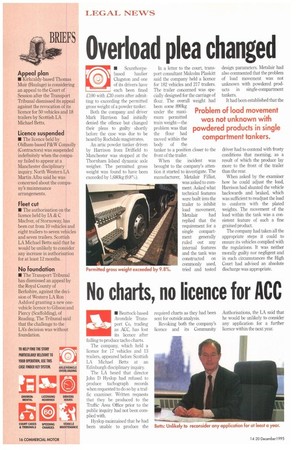Overload plea changed
Page 18

If you've noticed an error in this article please click here to report it so we can fix it.
• Scunthorpe
based haulier Clugston and one of its drivers have each been fined £100 with f.30 costs after admitting to exceeding the permitted gross weight of a powder tanker.
Both the company and driver Mark Harrison had initially denied the offence but changed their pleas to guilty shortly before the case was due to be heard by Rochdale magistrates.
An artic powder tanker driven by Harrison from Driffield to Manchester was stopped at the Thornham Island dynamic axle weigher. The permitted gross weight was found to have been exceeded by 1,680kg (9.8%). In a letter to the court, transport consultant Malcolm Plaskitt said the company held a licence for 182 vehicles and 217 trailers. The trailer concerned was specially designed for the carriage of flour. The overall weight had been some 890kg under the maximum permitted train weight—the problem was that the flour had moved within the body of the tanker to a position closer to the front of the trailer, When the incident was brought to the company's attention it started to investigate. The manufacturer, Metalair Filliat, was asked to comment. Asked what technical features were built into the trailer to inhibit load movement, Metalair had replied that the requirement for a single compartment generally ruled out any internal features and the tank was constructed on commonly used, tried and tested design parameters. Metalair had also commented that the problem of load movement was not unknown with powdered products in single-compartment tankers.
It had been established that the driver had to contend with frosty conditions that morning, as a result of which the produce lay more to the front of the trailer than the rear.
When asked by the examiner how he could adjust the load, Harrison had shunted the vehicle backwards and braked, which was sufficient to readjust the load to conform with the plated weights. The movement of the load within the tank was a consistent feature of such a fine grained product.
The company had taken all the appropriate steps it could to ensure its vehicles complied with the regulations. It was neither morally guilty nor negligent and in such circumstances the High Court had advised an absolute discharge was appropriate.












































































































